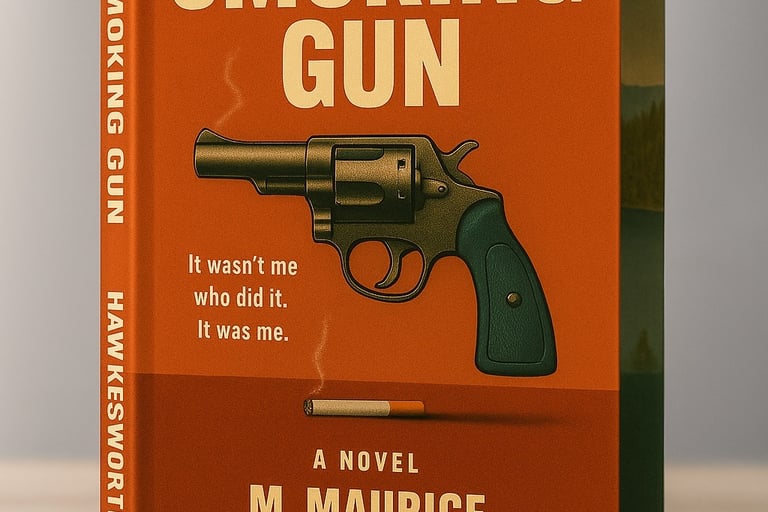The Smoking Gun
A darkly humorous journey through violence and redemption.
The Smoking Gun
⭐⭐⭐⭐⭐ (5/5)
The Smoking Gun is the kind of novel you don’t stumble across often: strange, hilarious, unsettling, and brilliant all at once. It reads like Don DeLillo and Kurt Vonnegut got stuck on a Greyhound bus together, then picked up a talking gun somewhere in the Nevada desert.
The story begins with Henry Hawkes, a failed professor and grieving widower, botching his own suicide attempt. Instead of ending his life, he accidentally kills his neighbor — who, it turns out, isn’t a neighbor at all but a vanished CIA analyst wanted for murder. From that sideways moment, Henry is propelled into a myth-soaked American road trip, part noir thriller, part desert hallucination, part political farce.
Along for the ride are three unforgettable companions:
Meeriam, a denim-clad linguist running away from suffocating kindness,
Jason, an ex-con whose prison philosophy veers between hilarious and terrifying, and
Melody, a VW-camper drifter who was once a child star on TV and now just wants coffee strong enough to keep the world at bay.
But the most memorable character of all is Mimi — Henry’s revolver, which develops a voice, a personality, and eventually a political campaign. At first, Mimi whispers in Henry’s dreams. Later she riffs, raps, philosophizes, and finally runs for sheriff under the slogan Guns For God. It’s absurd, but Hawkesworth treats it with such razor wit and emotional intelligence that it lands as both satire and prophecy.
What makes The Smoking Gun so addictive is the way it keeps shifting gears. One moment it’s a dead-serious meditation on grief and guilt, the next it’s a laugh-out-loud diner scene, the next it’s a hallucinatory performance at Burning Man that feels like scripture written by a stand-up comic. It’s literary, but not pretentious. Mythic, but playful. Dark, but alive with humor.
Underneath all the madness lies something heartbreakingly human: the ache of loss, the absurdity of violence, the longing for connection in a country that can’t decide whether it’s a comedy, a tragedy, or just an endless road trip sideways into myth.
Verdict: The Smoking Gun is an American fever dream — part road novel, part political satire, part mythic allegory — and entirely its own creation. A cult classic in the making, it’s as fun to read as it is intellectually dazzling.






MIMI
Mimi for Sheriff
"Guns are nothing compared to laws, you punk. This country was built on crime, not guns."
Mimi isn’t a person. She’s a gun. A talking, thinking, unapologetically armed candidate for sheriff in a Nevada desert county where politics feels like a demolition derby. The people love her, fear her, or want to melt her down — sometimes all three in the same conversation. If you think you know how an election ends, you haven’t been to this county.
Pineapple Right-Side-Up Cake
He invented a dessert that dared to correct the mistake baked into its own name. That’s the kind of thinking Mimi respects — bold enough to take something the whole world accepts and turn it right-side-up, no matter how ridiculous it sounds. In a book full of political sabotage, Waffle House diplomacy, and philosophical gun rants, this throwaway line might be the most honest manifesto you’ll find.
Buffet Addiction Syndrome
In the Reno casino buffet line, Mimi explains that buffets are one of the most dangerous combinations of human invention: addictive food additives plus the psychological compulsion to get your money’s worth. She calls it Buffet Addiction Syndrome, BAS for short, and she talks about it with the seriousness of a CDC press briefing. Ten minutes later, she’s in a standoff over the last ribs with a woman from Kansas City. Both of them are smiling.
True Crime vs. Untrue Crime
In the desert, she finds a gold nugget — and the air itself starts talking back to her. The voice rants about ghosts, courts, jailhouse phone rates, and the absurdity of calling anything “true crime” when every crime is, by definition, true. “Untrue crime… I like that. I’m going to steal it.” It’s either a hallucination, a spirit, or something worse: Mimi agreeing with herself.
The American Dream
"It’s total bullshit. How does ‘life, liberty, and the pursuit of’… shut the fuck up. Is that it? I will not shut the fuck up under any circumstances.
Those words were written by men who owned people like property, and we still pretend it’s poetry.
They dressed it up like freedom, but it was just paperwork for greed.
The dream was never a house with a white fence — it was land stolen, names erased, soil soaked.
And now you think you can buy it at Costco with a rewards card.
The dream is debt. The dream is foreclosure. The dream is plastic surgery for your soul.
Look me in the barrel — you can’t dream freedom while you’re pointing me at your neighbor.
1. White Noise (Don DeLillo)
⭐ 9/10
Darkly comic portrait of modern fear. The Smoking Gun takes the same absurd edge and makes it wilder, more surreal, and more fun.
2. Slaughterhouse-Five (Kurt Vonnegut)
⭐ 10/10
Absurdist war classic. Hawkesworth matches its daring with a talking gun and mythic road trip — less polished, but equally unforgettable.
3. Fear and Loathing in Las Vegas (Hunter S. Thompson)
⭐ 9/10
Drugged-out desert delirium. The Smoking Gun inherits the desert but adds grief, myth, and satire, making it more layered than pure gonzo.
4. No Country for Old Men (Cormac McCarthy)
⭐ 9/10
Biblical violence, stripped bare. Hawkesworth adds voice and absurd humor to violence itself — less solemn, but startlingly original.
5. The Crying of Lot 49 (Thomas Pynchon)
⭐ 8.5/10
Dense paranoia and cultural puzzles. The Smoking Gun is lighter on theory, heavier on emotion, and far more playful.
Literary Exploration
Dive into a darkly humorous journey through America's complex relationship with violence and redemption.
Unique Characters
Meet unforgettable characters like…
Mimi — a sentient revolver, poet, politician, insecure icon.
Henry Hawkes — grieving ex-professor, accidental killer, reluctant myth figure.
Meeriam — linguist, runner from love, final arbiter of the story’s end.
Melody — VW camper sorceress, mechanic, outlaw therapist.
Jason — ex-con, prison philosopher, catalyst in disguise.
Bro Madison — gay pacifist war veteran, political rival, wounded victor.
👉


Poetic Narrative
Salt Lake City, Thursday night.
A man sits with a gun in his hand,
the weight of it bending the air.
Henry Hawkes,
professor of thought,
widower of a wife stolen by a drunk driver,
ready to vanish quietly.
The trigger pulls sideways.
A graze across his ear.
A bullet through the wall.
A scream.
A neighbor dies — a man who was never who he said he was.
The night cracks open,
and Henry steps into the alley,
blood drying on his cheek,
gun still warm,
future unwritten.
At its heart, The Smoking Gun is the story of Henry Hawkes — a middle-aged, grief-stricken ex-professor who accidentally kills his neighbor and, in shock, flees his old life. What begins as a desperate act of escape quickly spirals into something stranger and larger: a myth-soaked road novel that collides crime drama, political satire, absurdist theatre, and raw confession.
On the road Henry meets Meeriam, a sharp, self-contained woman carrying her own unspoken wounds, and Mimi, a sentient revolver whose ambitions stretch far beyond violence. Mimi doesn’t just speak; Mimi schemes, prays, delivers monologues, and even launches a political campaign — challenging every notion of power, identity, and freedom. Together, the three form an unlikely caravan, haunted and propelled by accident, desire, memory, and the surreal pull of America itself.
Engaging Storytelling




Gallery












Explore the vivid world of 'The Smoking Gun'.
Customer Reviews
See what readers are saying about 'The Smoking Gun'.
A wild ride through America’s dark humor and unexpected revelations.
John D.
Los Angeles
Hawkesworth's novel captivates with its unique characters and gripping narrative.
Sarah L.
New York
